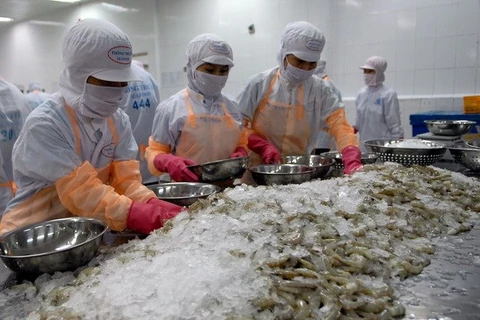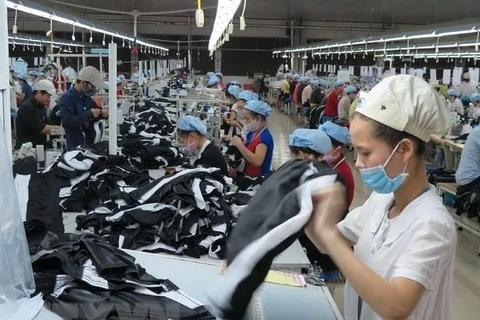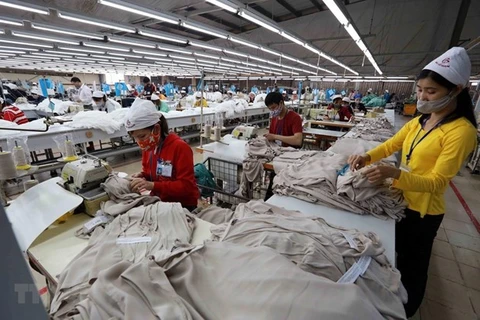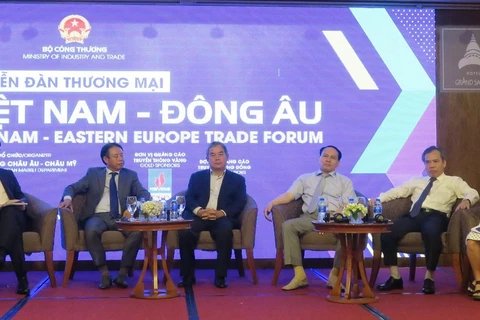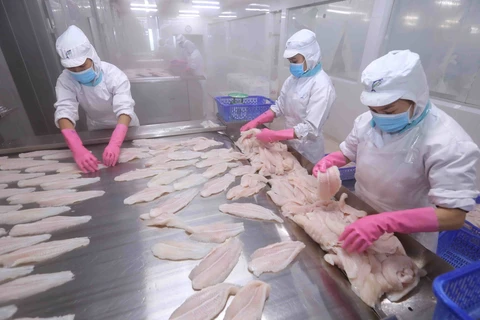 Workers process squid for export at the factory of the Huy Nam Co. Ltd in Chau Thanh district, Kien Giang province (Photo: VNA)
Workers process squid for export at the factory of the Huy Nam Co. Ltd in Chau Thanh district, Kien Giang province (Photo: VNA) Hanoi (VNA) – The participation in new-generation free trade agreements (FTAs) has proved to be a driving force for exports but also posed challenges for Vietnamese firms in meeting importers’ requirements and competing with foreign rivals right in the domestic market.
Since Vietnam entered the World Trade Organisation in 2007, it has negotiated 16 FTAs, 12 of which have been inked and taken effect. While the EU-Vietnam FTA has its talks concluded and is waiting for ratification, three other deals are under discussion, namely the Regional Comprehensive Economic Partnership, the FTA between Vietnam and the European Free Trade Association, and the one between Vietnam and Israel.
Exports to the countries that have had FTAs with and export structures complementary to Vietnam have increased, including Japan, the Republic of Korea, Australia, New Zealand and the Eurasian Economic Union. The shipments of commodities to many markets like China, ASEAN, Japan and the Republic of Korea have posted even double-digit growth rates.
On the other hand, trade deficit has also been growing due to the rising demand for imports from the partners. The domestic market will no longer be the strength of Vietnamese businesses when the country fully implements commitments under FTAs.
Tran Thanh Hai, Deputy Director of the Ministry of Industry and Trade (MoIT)’s Export-Import Department, said the new-generation FTAs include more complex and stricter provisions compared to old ones. Therefore, if frequent training programmes are not organised, businesses will be unable to update themselves about FTAs and make use of preferential treatment under these deals.
Market expansion is a long-term strategy that will help Vietnamese companies further take part in regional value chains, improve their export manufacturing capacity and competitiveness, and gain a foothold in the domestic and foreign markets, he noted.
The MoIT also recommended businesses have good knowledge of export markets’ legal frameworks and technical barriers to stay active in export activities.
Pham Quynh Mai, Deputy Director of the MoIT’s Multilateral Trade Policy Department, said although provisions in FTAs are beneficial to Vietnam, if enterprises fail to capitalise on them, they will be unable to expand markets and increase export value.
She called on firms to swiftly change their mindset and realise their role in the implementation of FTAs by actively seeking relevant information. They should also continually improve their technology and product quality to meet the standards set by import countries.
Some insiders suggested Vietnamese businesses consider competition pressure as the momentum for reforms and coordination with other firms in the same industries.
They also asked authorised agencies and business associations to support exporters by giving instructions on FTA implementation and simplify administrative procedures.-VNA
VNA
